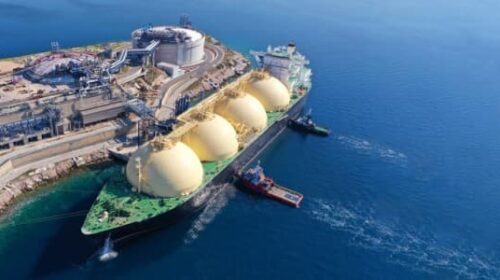For over six months now, Europe has been the key driver of global demand for liquefied natural gas (LNG) as it looks to replace as much Russian pipeline gas supply as soon as possible. Since the energy crisis of last autumn, Europe has displaced Asia as the growth driver of LNG demand and is no longer “the market of last resort” for LNG cargoes. The Russian invasion of Ukraine has further spurred Europe to start reducing its heavy reliance on Russia’s piped gas, without which the continent currently risks a severe industrial slowdown and a rush to secure heating for next winter.
At the same time, Asian demand for LNG is weaker than over the past decade, with imports in major buyers in the region—including China—falling in the first quarter of 2022 from the same period a year ago and total imports for 2022 expected to be broadly flat compared to 2021.
Before the Russian war in Ukraine upended energy markets, analysts had expected healthy growth in Asian LNG demand and imports for this year. However, the race with Europe for LNG spot supply drove prices so high that many buyers in Asia are sitting out the spot market buying spree in the spring. Asia has typically used the spring season to stock up on cheap LNG once winter demand—and higher winter prices—are over.
With the heating season over, prices have fallen, but they are not as nearly as cheap as they were at this time last year.
That’s because Europe is in an unprecedented rush to replenish gas inventories after the winter and to be as much prepared for the next winter—and for the possibility that Russia may cut off gas supply to other EU members after Poland and Bulgaria—as technically possible.
A few weeks after the winter heating season ended, Europe is doing a good job replenishing its gas in storage, thanks to a massive fleet of LNG tankers arriving at European import terminals.
Europe is now the most attractive destination for global LNG flows, outbidding Asia for spot supply after the EU’s irreversible decision to stop being beholden to Putin for its gas consumption as fast as is feasible. The overall EU reliance on Russia’s gas was around 40 percent pre-war, with dependence varying greatly among member states.
Gas storage in the EU is now 40% full, data from Gas Infrastructure Europe showed. This compares with just 26% as of April 1. Since the beginning of April, the European Union has added 151 terawatt-hours (TWh) worth of natural gas stocks to its storage, according to the data, which suggests that Europe is filling its gas storage at a record pace these days.
Gas stocks in the EU and the UK combined are now at 450 TWh, in line with the prior 10-year average and 21 TWh above the pre-pandemic five-year average through 2019, Reuters market analyst John Kemp has estimated.
A return to the average level of gas stocks is good news for Europe, but it doesn’t secure its energy for the next winter—yet.
Strong LNG demand in Europe while China grapples with COVID-related lockdowns suggests that Europe will continue to be the preferred destination of spot LNG cargoes at least this year and next.
Meanwhile, Asia is reducing LNG imports compared to year-ago levels as countries prefer to draw from stocks rather than pay for expensive spot LNG and trying to compete with Europe, which is politically motivated to pay whatever price for non-Russian gas supply.
Asian LNG imports fell 10% year-on-year in Q1 2022, with Chinese, Japanese, and Indian imports down 11%, 14%, and 25%, respectively, Wood Mackenzie has estimated. Overall Asian LNG demand is now expected to be flat this year compared to 2021, WoodMac says.
“With only modest volumes of new LNG supply coming onstream during this period and Europe’s decision to diversify away from Russia now irreversible, the stage is set for fierce competition,” Gavin Thompson, Vice Chairman, Energy—Asia Pacific, at Wood Mackenzie said last month.
“As Massimo Di Odoardo from our global gas team puts it, to meet their LNG future demand over the next few years “Europe and Asia are both going to be pulling at the same blanket,” Thompson added.







